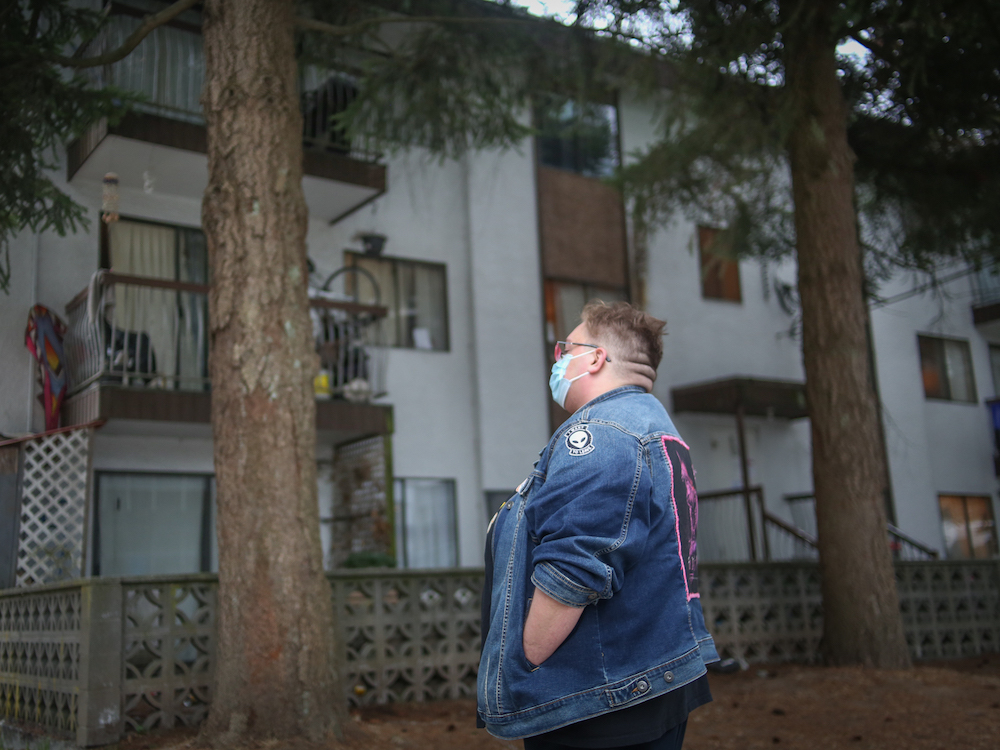Megan Paulic wondered if they had found a loophole in the Residential Tenancy Act.
It all started in 2020 when they were combing through pricey listings and enduring crowded group showings in search of a place to rent. Paulic had always had roommates, because living in Metro Vancouver didn’t seem possible for them without at least one.
“I make a decent income, one that my parents would’ve envied when they were my age,” said Paulic, who is 33 and works as a supervisor in manufacturing.
“I could barely find a place that adheres to that rule of not paying more than 30 per cent of my income [on housing], so that I can actually have a safety net if something bad happens.” According to public agencies like the Canada Mortgage and Housing Corp., that’s the percentage considered “affordable.”
Paulic finally found someone looking to share a two-bedroom unit in an apartment building. It was just off of Vancouver’s Commercial Drive and the apartment rented for $1,800 a month. Splitting that cost with a roommate was within their budget. Paulic’s roommate had already signed a lease with the landlord, so Paulic moved in without any paperwork.
Then in 2022 the roommate decided to move out. Because the roommate was the tenant who had signed the lease and Paulic merely an occupant without their name on paper, the building manager terminated the lease.
The manager allowed Paulic to stay — but they would have to sign a new lease and pay $100 more a month.
Paulic decided to stay. But the increase upset them because they realized they were powerless and the manager could have charged whatever she wanted for a new lease.
So, together with a new roommate, Paulic decided to sign on to the new lease as co-tenants, thinking that they’d be better protected.
Earlier this year, Paulic decided to move out, as the location proved to be too far from their workplace. Their roommate, however, was interested in staying.
Paulic told the manager this when they were giving notice, only to receive alarming information: their lease would be terminated.
The manager offered the remaining roommate the chance to sign on to a new lease for $2,450 a month, an increase of 29 per cent or $550. When he took too long to get back to the manager, she posted an ad for the unit on Craigslist for $2,700 a month and began arranging showings.
According to British Columbia’s Residential Tenancy Act, when any of the co-tenants who have signed on to a lease gives notice to move out, regardless of whether there is someone who intends on staying behind, the lease is terminated for all parties.
That’s why it’s legal for landlords to ask anyone interested in staying behind for higher rent than before — because they are doing so for a brand new lease.
“I know some people will say, ‘That’s why you have to buy your own place,’” said Paulic. “But do you really expect everyone to do that?”
A ‘completely legal’ loophole?
“It’s a loophole in the act,” said volunteer advocate Will Gladman of the Vancouver Tenants Union.
For a year and a half, he has heard from roommate renters facing this dilemma of paying higher rent or being displaced from their homes.
Gladman calls it a loophole because it’s a way for landlords to get around the maximum allowable rent increase set by the province each year. The rent control applies to ongoing tenancies, but not when tenants change.
“Unfortunately, there’s so little scrutiny around this issue because it’s completely legal,” he said.
Hunter Boucher, vice-president of operations at LandlordBC, says that new leases in such cases are necessary because it is a new arrangement of tenants.
“A tenancy has come to an end, and what’s being presented to the landlord is a new situation altogether,” said Boucher. “The idea here is to mitigate their potential liability.”
In B.C., roommate households — defined as consisting of two or more unrelated people — total almost 109,000, according to the 2021 census. They represent 5.3 per cent of the province’s households. Nationally, they are the fastest-growing household type, according to Statistics Canada.
It’s no surprise that people are living together in hot markets to split costs. But in cases where renters are paying less than market price, Gladman says, it’s in the interest of landlords to charge as much as they can when possible.
It’s not just single roommates caught in the co-tenancy “loophole.” It’s also couples breaking up, couples with a child on the way who have to ask their roommate to leave and families whose names are on the same lease, he says.
“As more people live with roommates, more people are going to be exposed to this and be vulnerable to this problem.”
Not all roommates are equal
The province and tenant and landlord groups all agree on one thing: there could be more education on the legality of roommates.
“It’s not incredibly difficult information to gather, but it’s also not just out there,” said LandlordBC’s Boucher. “When you’re entering into this type of agreement as a tenant... you need to be aware of what those implications are of sharing your space.”
Depending on the situation, roommates have different designations — and different rights — under the Residential Tenancy Act. They could be tenants in common, co-tenants or occupants.
“Tenants in common,” as defined by the tenancy act, are roommates who share the same unit but have separate tenancy agreements with the landlord. An example of this situation is tenants renting individual bedrooms in a shared house. People renting in this situation are unaffected by the actions of their roommates.
“Co-tenants” under the act are roommates who sign the same lease with the landlord. The lease ends when one of the co-tenants gives notice, regardless of what the other roommate’s or roommates’ plans are.
Gladman has heard from co-tenants like Paulic who thought they were being responsible by letting their landlord know about their plans to move out, unaware that they were ending the lease and jeopardizing the housing of their fellow co-tenant.
“I’ve had a lot of people contact me who say, ‘I had no idea I was doing that,’” he said. “By that point, it’s too late.”
One way that a co-tenant can move out without putting the other at risk is by not giving notice to the landlord, a situation that is described in the province’s tenancy guidelines.
One person who reached out to The Tyee said that he is still a co-tenant on paper, despite having moved out of a unit four years ago. He did not want to end the lease, as it would cause his landlord to ask his former roommate to sign a new one at market rate. He asked for us not to share his name to protect his roommate’s housing.
“I don’t think anyone wants to have some sort of phantom tenancy hanging over them when they’ve moved on somewhere else,” said Gladman, as it would mean that the departed tenant is still liable for what happens to the unit because their name is still on the lease.
Obstructing occupants
Aside from the co-tenancy “loophole,” renters who are occupants or tenants with occupants have run into problems too.
“Occupants” are defined as roommates of a tenant, the one who has signed a lease with the landlord. Occupants are not protected by the tenancy act and cannot access the Residential Tenancy Branch’s dispute resolution service.
If a tenant gives notice to the landlord, the tenancy ends. Paulic’s first roommate in Vancouver was the actual tenant, who ended the lease after he gave notice. That left Paulic, the occupant who was never on the lease, in limbo.
“It’s a gap in protection and rights,” said Zuzana Modrovic of the Tenant Resource and Advisory Centre. “People who are occupants don’t have any rights under the act, and that seems drastically unfair.”
A head tenant can rent to occupants who come and go under a standard tenancy agreement, a common arrangement when a landlord leases a whole house to a tenant to manage.
However, some landlords may include a clause in the lease regarding occupants, such as requiring their permission to be given before one can live in the unit.
Rachel Penner, a renter in the West End, ran into one such clause. She was the sole tenant of a unit and had no issues renting to a roommate occupant in the past.
The clause stated that a tenant’s occupants require written landlord approval or they face a breach of the lease, but the building manager said the language was merely a formality so that basic information about the occupant would be recorded, she said.
But then the building manager was replaced with a property management company. When Penner notified them about a potential change in roommates, they told her that a new lease would be required as it “terminates” the agreement in place.
“Dealing with this issue was basically a full-time job,” she said. “I was phoning the RTB [Residential Tenancy Branch] multiple times, talking to other tenants in my building, connecting with the Vancouver Tenants Union... and at the same time trying not to be completely overwhelmed by the psychological and emotional stress.”
The Residential Tenancy Branch told Penner that she did not need to sign a new lease to have another occupant, but after the management company insisted that she had to, she decided to hire a lawyer.
After a number of weeks, the management company came to the conclusion that Penner could get a roommate occupant without signing a new lease.
“I’ve had several points of both privilege and luck to be able to deal with this,” said Penner.
She knows that many people don’t have the resources or knowledge or aren’t in a life situation where they can push back. Penner shared that she is a professional writer and researcher, had built up some savings and is self-employed, so she had the time to manage her workload around dealing with the landlord issue. Renters who might be new to B.C. without knowledge of tenancy law, don’t speak English or have family living with them whose housing they don’t want to endanger might just go along with what the landlord says.
“But also, it sucks that I had to hire a lawyer just to get my landlord to follow the law,” said Penner.
Vacancy control off the table
At the beginning of the year, Premier David Eby said there “seems like there’s no end of creativity on the part of some people that are seeking to exploit renters” and called roommate issues “particularly challenging.”
In the summer, Housing Minister Ravi Kahlon chimed in, saying that he’s looking into how to support co-tenants and stressed the importance of education on roommate legalities for tenants before signing on to a lease.
Gladman at the Vancouver Tenants Union suggests that the Residential Tenancy Act be changed to allow landlords to reassign leases to a co-tenant who chooses to stay in the unit, similar to the language that already exists around sublets.
Modrovic at the Tenant Resource and Advisory Centre suggests that vacancy control — preventing landlords from increasing the rent between tenancies — would help. That way, when landlords ask for a new lease, whether it’s because a co-tenancy or a tenancy with occupants has ended, the rent can’t be hiked beyond what the province allows per year. In September, the BC General Employees’ Union called on the province to adopt the tool.
However, Kahlon has rejected vacancy control, saying at a conference last month that a task force “recommended to us that that may inhibit more purpose-built rental to be built.”
Boucher at LandlordBC agrees with the province’s decision.
“Right now is not a time for more restrictive rental housing regulation,” he said. “We need to ensure that there is feasibility for landlords to recoup those costs, especially over long-term tenancies.... Part of running that business is being able to charge at market rent upon turnover.”
The Tyee reached out to the Ministry of Housing, which said that it is still “exploring potential improvements to make tenancies fairer for co-tenants, including improving education and awareness.”
The ministry added that the “Residential Tenancy Branch encourages landlords to carefully consider the rental landscape when setting rent increases. Renters are also advised to fully understand the tenancy agreement that they are signing.”
Roommate cities?
Living in their Commercial Drive apartment in East Vancouver, Megan Paulic experienced two types of roommate problems. First, it was as an occupant left at risk by their departing roommate, the unit’s tenant. Then, it was as a departing co-tenant who left their fellow roommate co-tenant at risk.
Paulic has since put their possessions in storage and is staying with family while they search for their next place to rent.
“I’m really lucky that I have people I can fall back on,” they said.
At almost three years, the East Vancouver home was the longest place they’ve ever lived. Paulic has moved almost 30 times, never living in one place for more than a year and a half, and feels a lot of anxiety around housing security. It was frustrating to have to deal with a landlord looking to collect more rent from them.
“It’s exhausting,” they said, “to be at the whim of other people, to not have a place to go to consistently and know that you’re going to be there for the next while.”
Paulic has accepted that when they eventually find another home, they’re going to need a roommate again in pricey Metro Vancouver. Compounding the issue of roommate legalities is the issue of finding someone with whom they’re compatible.
“It’s Russian roulette. How can you get to know someone after a short interview?” they said. “Everyone is now being forced into a situation where they have to live with multiple people. They have to take these chances on a regular basis, and then they’re vulnerable any time it doesn’t work out.” ![]()
Read more: Rights + Justice, BC Politics, Housing

















Tyee Commenting Guidelines
Comments that violate guidelines risk being deleted, and violations may result in a temporary or permanent user ban. Maintain the spirit of good conversation to stay in the discussion and be patient with moderators. Comments are reviewed regularly but not in real time.
Do:
Do not: